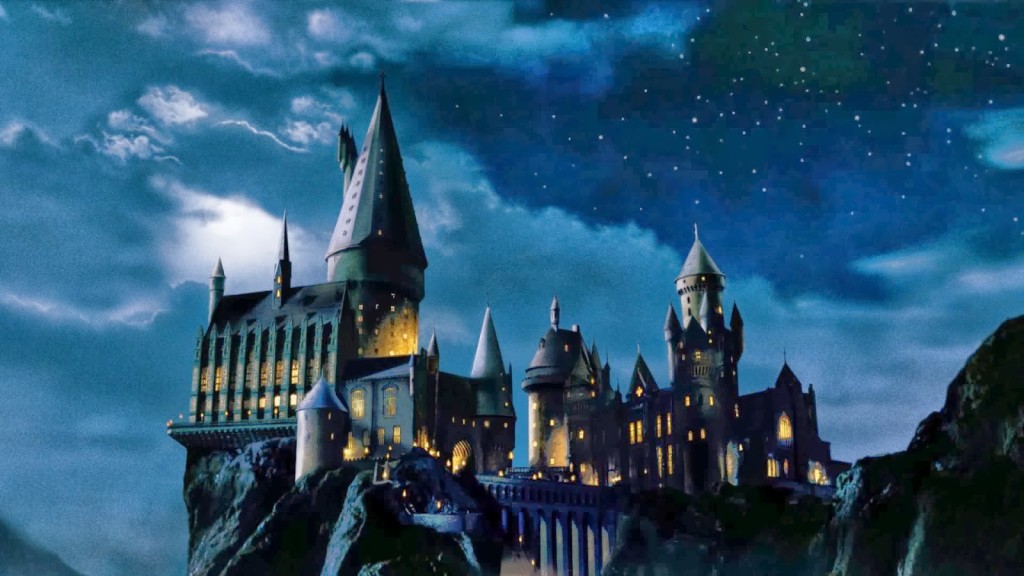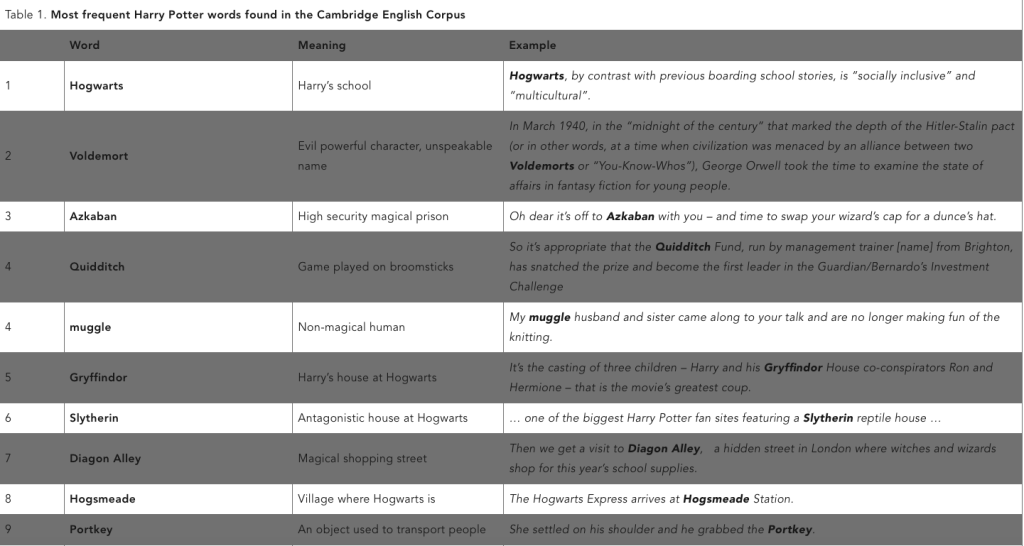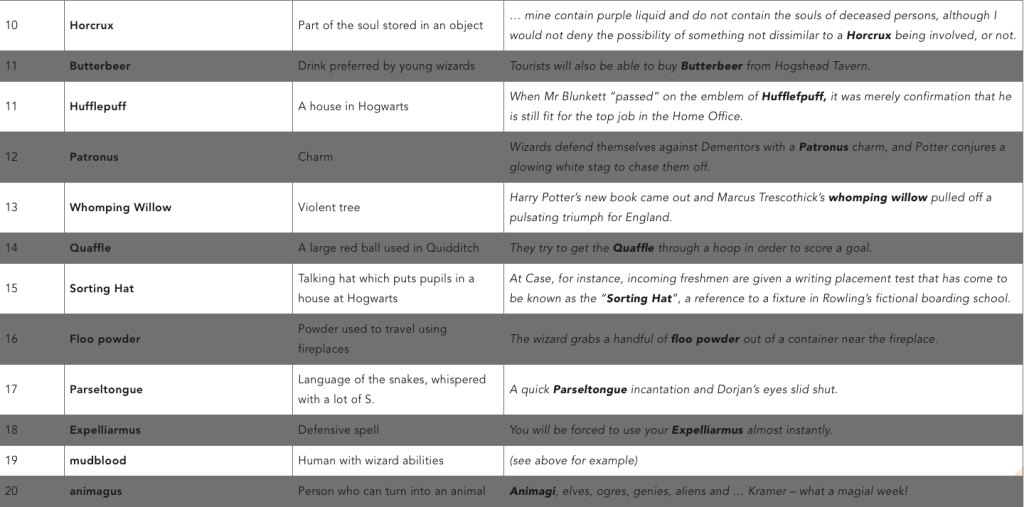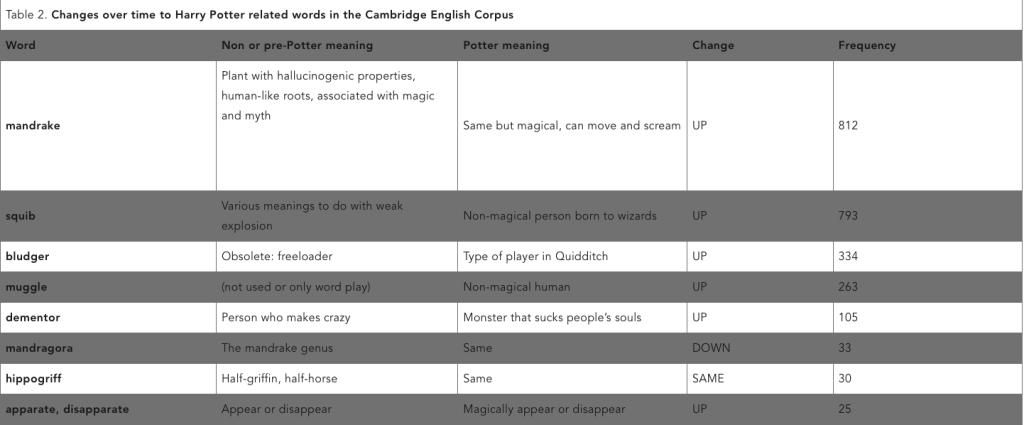
Harry Potter turned 20 this year (the first in the series, Harry Potter and the Philosopher’s Stone, was published in 1997) and this has seen a whole raft of events to celebrate the anniversary, including the publication of 2 new companion books to coincide with the opening of Harry Potter: A History of Magic at the British Library. Harry Potter has contributed considerably to modern culture in the English speaking world but what about its impact on the English language? Resident language researcher Matt Norton takes a look using data from the Cambridge English Corpus and the Spoken British National Corpus.
Probably everybody has heard of Harry Potter. Most will also know some of the memorable words that feature in both the book and the film series. Certainly J.K. Rowling has contributed a number of new words to the English language as it is written and spoken today – there are hundreds of distinctively Potter-esque words that feature in the series. In order to investigate the impact this has had on modern English, we can use the Cambridge English Corpus (CEC) – a multi-billion word collection of contemporary spoken and written English and our most current collection of spoken British English (the Spoken British National Corpus). Both contain many Harry Potter words, some used quite frequent and some fairly rarely. In this article I use corpus linguistics to examine how the world of Harry Potter – or the ‘Potterverse’ – has influenced English with new words invented by Rowling (“coinings”); her reusing of rare or obscure words; and changes to existing word usage.
J.K Rowling’s use of language in the Harry Potter series
The Potter series shows a clear love of language. For example, we can see this by looking at the word-play involved in blend words – words made up from fusing two words together. Examples in Harry Potter include words like ‘animagus’, a blend of animal and magus (a kind of wizard, plural magi), and ‘merpeople’, blending from mer(maid) and people. Some of the words sound like parodies of English words, like ‘Hogwarts’, the name of Harry’s ‘School of Witchcraft and Wizardry‘, ‘Hufflepuff’ house or the game ‘Quidditch’. Although ‘Hogwarts’ sounds like a combination of hog and wart, there is also a plant called hogwort, which is a genuine English word, which may have also influenced this creation. So it seems that the English language may have already contained ‘otterisms before Potter, but they were obscure or “hidden”, a bit like how the magical world is hidden from humans in the Harry Potter series!
Rowling often uses imitation Latin, also known as dog Latin, especially in the spells or charms, such as ‘Expelliarmus’, the defense spell; ‘Expecto Patronum, to protect against dementors; and ‘Finite Incantatem’ (end the spell). The magical object ‘Horcrux’ has a dark, occult-like tone and appears to be a blend of horror (or similar Latin word) and Latin crux meaning cross.
Words invented by J.K. Rowling
J.K. Rowling invented numerous words across the series – examples of the most frequent of these new Harry Potter words as found in the Cambridge English Corpus are shown in table below. What’s interesting to note here, is that often these words are used in context beyond talking about the Harry Potter books or films. In these cases the meaning of a word has been extended and applied to the real world. Lots of examples of this were found in the collection of spoken conversations (the Spoken BNC).


Hogwarts is the most popular newly-invented Harry Potter word in the data. It can be used to refer to large, old, dramatic buildings which have an appearance similar to Hogwarts, such as some of the older Cambridge University colleges. It can also be used to refer to university in general, e.g. in this example:
A: “It’s was so nice to be back at Uni again, you know?”
B: “Oh yeah I forgot, how are things going at Hogwarts?”
Aside from Hogwarts, Voldemort is the next most frequent coining in the Cambridge English Corpus. His name can represent a great evil power who may be so bad that his name cannot be uttered. In our data, we also see it used to refer to very bad people in general, e.g. dictators or warlords:
“…in the “midnight of the century” that marked the depth of the Hitler-Stalin pact (or in other words … an alliance between two Voldemorts or “You-Know-Whos)”
This new word also gives rise to Voldemortesque, Voldemortish and similar compounds. The name Voldemort seems to come from the French words “vol de mort” or “flight of death” or possibly “theft of death”.
Mudblood is a word often used by malevolent characters to refer to part-human part-magical people. In the example shown below, this term is used in non-Potter contexts to refer to a person of mixed geographical heritage:
A: “So what am I? Born in Essex but I‘ve got a Geordie mother and a Scottish dad, so what does that make me?”
B: “Oh it’s a, that’s a foreign country Essex.”
A: “Am I a mudblood?”
The word ‘muggle’ is used in the book to mean humans, i.e. people who don’t have magical powers. Because wizards see muggles as somewhat lacking in skill or knowledge, the term ‘muggle’ has now come to mean someone who is not very skilled at something, in a more general sense. In the Cambridge English Corpus we see examples such as this one referring to people who don’t have skills in a particular area:
“My muggle husband and sister came along to your talk and are no longer making fun of the knitting.”
Harry Potter has contributed considerably to modern culture in the English speaking world. For example, in the Spoken BNC there is reference to a Harry Potter themed club night, and to speakers wanting to do a university degree in the science of Harry Potter. The term Harry Potter has 18.9 instances per million in the new Spoken BNC, beating other seemingly common English words such as ‘marriage’ with 15.5 and ‘magic’ with 16.81. The English language now also contains words such as ‘Potterdom’ (the fandom or sphere of Harry Potter), ‘Potterfic’ (Harry Potter fiction), ‘Potterhead’/’Potterholic’/’Pottermaniac’ (a fan of Harry Potter), ‘Potterian’ (relating to Harry Potter), and ‘Potterverse’ (the world in the Harry Potter series).
Words reused or repopularized by the Harry Potter books
By looking at how frequent Potter-esque words were both before and after Harry Potter was published, we can see how language has changed. The results of this can be seen below.

‘Dementor’ is an old Latin word meaning ‘one who makes crazy or dements‘. It has been revived by Rowling (though with a specific sense of a kind of soul-sucking monster), and its use sharply increases in the nineties. Again, we frequently see this word used in the Cambridge English Corpus in a non-Harry Potter sense:
“I called my kid a Dementor. Bad Mama! A gorgeous sweet friendly Dementor, who laughs at rolling soccer balls and squirty bath toys, but still.”
Squib is a strange English word. Its origin is apparently an imitation of a not very impressive explosion e.g. made by a firework and we have the term damp squib, meaning disappointment. There are actually many senses of this word though not often used. In Harry Potter a squib is a wizard born without magical powers, something very rare, much less common than the opposite ‘mudblood’. Use of ‘squib’ declines over the 20th century but the CEC shows it increases after Potter. Apparate (and its opposite disapparate) are words reused by Rowling to mean make oneself appear or disappear – magically of course. Bludger occurs only once in the corpus before Potter (“He was the cheekiest little bludger you’ve ever seen in your life”). Although it seems to have some obscure senses, mainly Australian slang for freeloader, it has over 300 occurrences so this could be a big increase in use due to Potter.
It’s clear that the language used in Harry Potter has changed the English Language, with many Harry Potter terms now used more widely by many speakers. How could you use Harry Potter words in your lessons? Download our suggested magical Harry Potter themed wordlistsfor beginner, intermediate and advanced learners, and let us know how you use them!
Source: Cambridge.org (Published by: Matt Norton. 20 October 2017)
 Blog EBE English Book Education
Blog EBE English Book Education



